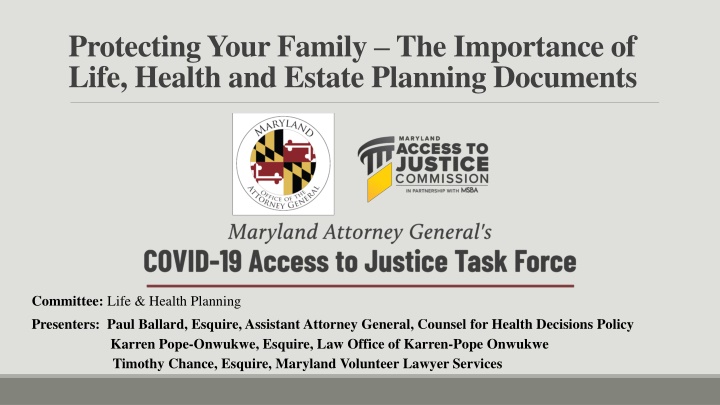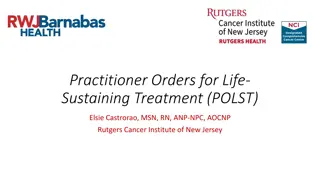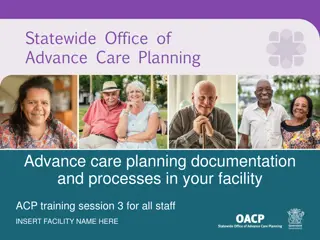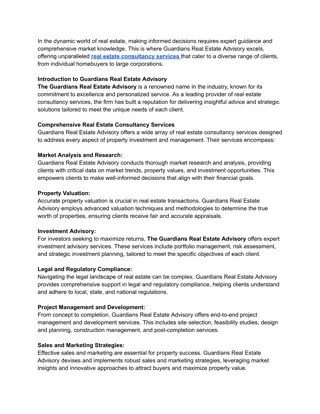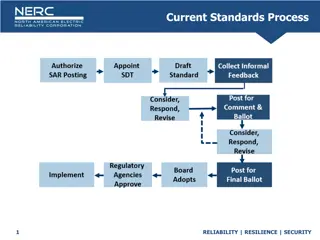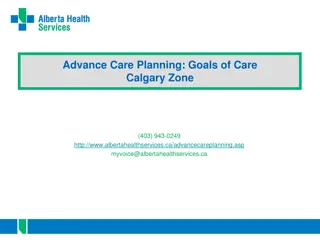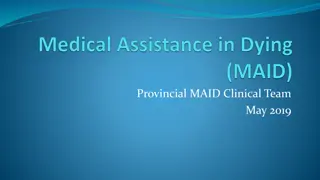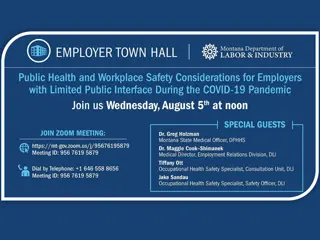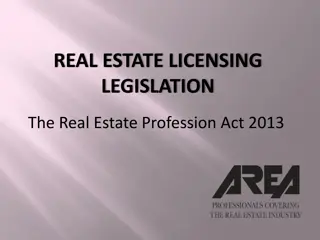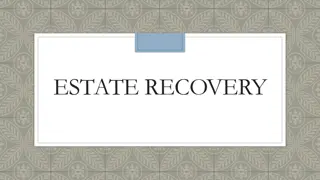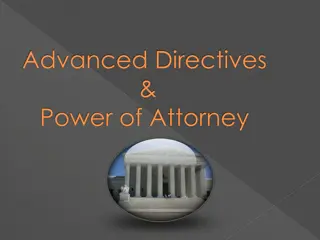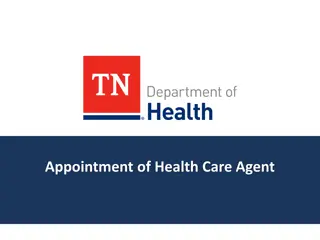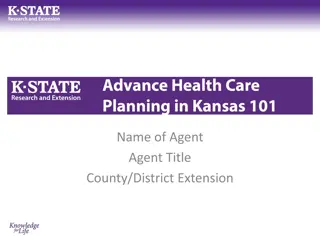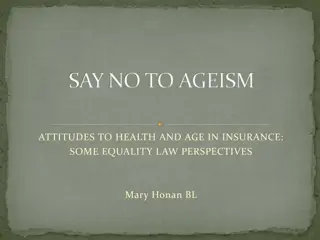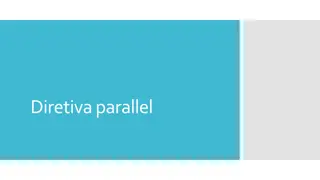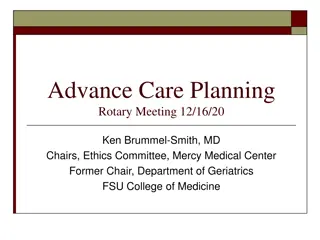Importance of Advance Medical Directives in Estate Planning
Understand the significance of advance medical directives in estate planning to ensure your healthcare wishes are respected. Learn how these legal documents, containing a healthcare power of attorney and living will, benefit both you and your loved ones. Find out where to obtain an advance medical directive form in Maryland to protect your family's future.
Download Presentation

Please find below an Image/Link to download the presentation.
The content on the website is provided AS IS for your information and personal use only. It may not be sold, licensed, or shared on other websites without obtaining consent from the author.If you encounter any issues during the download, it is possible that the publisher has removed the file from their server.
You are allowed to download the files provided on this website for personal or commercial use, subject to the condition that they are used lawfully. All files are the property of their respective owners.
The content on the website is provided AS IS for your information and personal use only. It may not be sold, licensed, or shared on other websites without obtaining consent from the author.
E N D
Presentation Transcript
Protecting Your Family The Importance of Life, Health and Estate Planning Documents Committee: Life & Health Planning Presenters: Paul Ballard, Esquire, Assistant Attorney General, Counsel for Health Decisions Policy Karren Pope-Onwukwe, Esquire, Law Office of Karren-Pope Onwukwe Timothy Chance, Esquire, Maryland Volunteer Lawyer Services
Purpose & Agenda Purpose: This program will explain the different type of legal documents available for handling one s personal and legal affairs during a time of illness and the steps that should be taken to provide for one s family at death. 1. Advance Directives & MOLST 3. Standby Guardian 2. Financial POA 4. Property ownership & titling 5. Wills & Non- Probate Transfers 6. Home Ownership & Deed
Part 1: What is an Advance Medical Directive? An Advance Medical Directive is a legal document that speaks for you if you can no longer speak for yourself An Advance Medical Directive can contain: o A Health Care Power of Attorney that enables you to choose someone you trust to make health care decisions for you; and/or o A Living Will that tells people what treatments you would want
Part 1: Why Should I Sign an Advance Medical Directive? An Advance Medical Directive helps to ensure the health care you receive is consistent with your wishes regarding your quality of life By making your wishes clear to your loved ones in an Advance Medical Directive, you help to ease their very difficult task of making health care decisions for you When your loved ones all know what health care you would want, this knowledge can help to alleviate their guilt and avoid bitter family disputes
Part 1: Where Can I Get an Advance Medical Directive Form? The Maryland Attorney General has an Advance Medical Directive form that can be downloaded here: https://www.marylandattorneygeneral.gov/Health%20Policy%20Do cuments/adirective.pdf You may email your request for a printed copy to adforms@oag.state.md.us,or call 410-576-7000, and a copy will be mailed to you. Other organizations also offer Advance Medical Directive forms that are legally valid in Maryland
Part 1: How Can I Make Sure My Advance Medical Directive is Valid? The Advance Medical Directive (AMD) must be about health care. You must sign and date the AMD and you need 2 witnesses. The witnesses cannot include someone you appoint to make your health care decisions and only one witness may financially benefit from your death. You do not need a notary but a notary can be one of your witnesses. You do not need an attorney but an attorney can be helpful. An AMD completed in another State is also valid in Maryland.
Part 1: Can I Complete an Advance Medical Directive Without Witnesses? You may complete an electronic advance medical directive without witnesses. The website will need personal information to make sure it is you. MyDirectives.com has been approved by the Maryland Health Care Commission as meeting certain standards. The MyDirectives.com website is here: https://mydirectives.com/ One additional advantage of an electronic advance medical directive is that it can be stored and accessed online.
Part 1: Where Should I Keep My Advance Medical Directive? Keep your Advance Medical Directive where it can be found easily. Give a copy of your Advance Medical Directive to your health care agent and your doctor. Complete a wallet card that tells people you have an Advance Medical Directive, who holds a copy of the Advance Medical Directive, who your health care agent is, and their contact information. The Maryland Attorney General s Office has a wallet card available here: https://www.marylandattorneygeneral.gov/Health%20Policy%20Docume nts/adDir_cards.pdf
Part 1: What is a Medical Orders for Life- Sustaining Treatment Options (MOLST) Form? A Medical Orders for Life-Sustaining Treatment (MOLST) form is a medical order form signed by your physician, nurse practitioner, or physician assistant. The MOLST form contains medical orders about treatments that keep you alive such as CPR, artificial ventilators, feeding tubes, etc. The MOLST form has medical orders to carry out your treatment wishes regarding your current medical condition.
Part 1: If I Sign an Advance Medical Directive Containing My Living Will, Why Would I Also Need a MOLST Form? A Living Will tells people what treatments you would want for a hypothetical future medical condition that you do not have now. A MOLST form contains orders about your current medical condition. Your health care provider signs a MOLST form when your current condition makes it necessary to have medical orders in place to ensure your treatment wishes are honored immediately. If you do not want CPR, you must have a DNR order in a MOLST form to prevent emergency medical personnel from beginning CPR.
Part 1: Where Do I Keep a Completed MOLST Form? Just like an Advance Medical Directive, a MOLST form should be kept with you where it can be easily found when you call 911. If your MOLST form contains a DNR order, keep the MOLST form on your refrigerator door, by your bedside, or behind your bedroom door because these are the places where emergency medical personnel have been trained to look for a MOLST form. If you want to be sure to have your DNR order honored wherever you might be, get a Medic Alert bracelet (they will need a signed MOLST form).
Part 1: Where Can I Get Further Information About Advance Medical Directives and MOLST Forms? Further information about Advance Medical Directives is available at the Maryland Attorney General s website at https://www.marylandattorneygeneral.gov/ Further information about the MOLST form is available at https://marylandmolst.org/index.html Your general questions about Advance Medical Directives and MOLST forms may be answered by emailing Maryland.molst@Maryland.gov, although legal advice should be sought from an attorney.
Part 2: Managing Financial Decisions Financial Power of Attorney Problem: A spouse, relative or friend does not have legal authority to manage your affairs if you are unable to do so yourself. Preferred Solution : Financial Power of Attorney Less Attractive Solution: Guardianship
Part 2: Managing Financial Decisions Financial Power of Attorney (continued) Principal appoints an agent to have authority to make financial decisions. Principal does not relinquish authority. Authority can be broad or narrow. Agent is fiduciary. Agent must be trustworthy. Can have more than one agent concurrently or consecutively.
Part 2: Managing Financial Decisions Financial Power of Attorney (continued) Principal must have legal capacity to sign the document. Document must be specific enough to allow third parties to accept document. Document can go into effect immediately or spring into effect at a later time. Principal has the right to revoke. Power of attorney terminates when principal dies.
Part 2: Managing Financial Decisions Alternatives to Power of Attorney Trust Joint Ownership If All Else Fails: Guardian of the Property More expensive More time consuming Requires court supervision
Part 3: Standby Guardian A person appointed by a parent of a child to take care of the child if the parent is unable to do so. Consent of both parents is needed (if available). Parental Designation and Consent to Beginning the Standby Guardianship Form. This form can be found at https://mdcourts.gov/sites/default/files/court- forms/ccgn041.pdf Goes into effect only when the parent is unable to care for the child because of mental incapacitation, physically debilitation, or because the parent is subject to an adverse immigration action. Lasts for 180 days. Standby guardian must petition the Court to continue the guardianship beyond 180 days.
Part 4: Property Titling Property titling means figuring out who owns property (such as a bank account or a home), and what rights each owner has to that property.
Part 4: Forms of Property Ownership/Titling Owning property alone (as the ONLY owner) Owning the property together with a spouse ( tenants by the entirety ) Owning the property together with one or more other people (this can be either joint tenants with rights of survivorship or tenants in common )
Part 4: Sole Ownership of Property If you are the only owner of any type of property, you are usually the only person with legal rights to access that property (for example, withdrawing funds from your bank account, or selling your home). If you become disabled, no one else can access that property unless either 1) you had already given them a financial power of attorney; or 2) they petition a court to become the guardian of your property. Upon your death, you can control who inherits the property. This can be done with beneficiary designations for some assets (usually for life insurance and retirement accounts), otherwise it can be done through your Last Will and Testament (if you have one, otherwise state law controls decides which of your family members inherit from you).
Part 4: Owning Property Together with a Spouse: Tenants by the Entirety Tenants by the entirety ownership of property means that the property belongs to the marriage, and not owned by either spouse separately. In Maryland (and some other states), this means that if one spouse has debts, the creditor who is owed money generally may not take any property owned as tenants by the entirety. For bank accounts, if one spouse becomes disabled, the other spouse can still access the bank account. For real estate, if one spouse becomes disabled, the other spouse would need a financial Power of Attorney or guardianship in order to sell or mortgage on behalf of the disabled spouse. If one spouse dies, the other spouse automatically inherits this type of property.
Part 4: Joint Ownership Joint Tenants with Rights of Survivorship Can be used for ownership by any two or more people. For bank accounts, if one owner becomes disabled, the other owner(s) will still have access to the property in bank accounts. For real estate, all owners can use the property, but if one owner becomes disabled and the property needs to be sold or mortgaged, someone else would need a financial Power of Attorney or guardianship to do so on behalf of the disabled owner. If one owner has debts, the creditor can access the property to be repaid. If one owner dies, the other owners automatically inherit the property.
Part 4: Joint Ownership Tenants in Common Can be used for ownership by any two or more people Can be equal, but does not need to be one owner can own 80%, and a different owner can own 20% For bank accounts, if one owner becomes disabled, the other owner(s) will still have access to the property in bank accounts For real estate, all owners can use the property, but if one owner becomes disabled and the property needs to be sold or mortgaged, someone else would need a financial Power of Attorney or guardianship to do so on behalf of the disabled owner. If one owner has debts, the creditor can access the property to be repaid. If one owner dies, the dead owner may choose who inherits his or her share of the property with a Will.
Part 4: Ownership Can Be Complex The forms of ownership can be combined! For example, the ownership in a home might be divided equally as tenants in common, but with 50% owned by a married couple as tenants by the entirety, and the other 50% owned solely by their daughter. The decision of how to title your property can significantly impact taxes, creditors rights, qualification for public benefits, and can change who can access or inherit your property. You may wish to consult with an attorney prior to making changes to the titling of your property.
Part 5: Wills & Non-Probate Transfers There are different ways that property can be transferred after death: Joint Ownership the individual(s) that are in joint ownership with you receive(s) the property automatically upon surviving you. Beneficiary Designation (also known as transfer on death TOD or payable on death POD ) - you designate who you want to receive the property on a designation of beneficiary form. Used for life insurance, IRAs, 401K, TSP, Certificates of Deposit, etc. Will a legal document that specifies who you want to receive property that is titled in your sole name (i.e., not in joint ownership and without a beneficiary).
Part 5: What else to know about Wills: WHAT A WILL CAN T DO: WHAT ELSE CAN A WILL DO? Names one or more persons to be guardians of your minor children Names who will be the Personal Representative of your Estate Directs that your Personal Representative be able to serve without filing a bond It cannot override joint ownership of property or beneficiary arrangements. It cannot take away from your spouse s right to inherit from you.
Part 5: What is required to have a valid Will? In writing Signed by you in the presence of two witnesses who are over the age of 18 Witnesses must watch you sign **Note: A lawyer is not required, but a lawyer may be able to help you guide you with complicated situations such as planning for blended families or family members with disabilities or special needs.
Part 5: Where should I keep my Will? It is important to ensure that your original Will be located after your death. In Maryland you may store your Will with your County s Register of Wills. Some store their Will at home, with their attorney or in a safe deposit box. If in a safe deposit box, make sure others are able to access the box n the event of your death.
Part 5: What is probate? Probate is the process of distributing property under your Will, if you have one, or to your closest living relatives if you do not have a Will. The Court appoints a Personal Representative for your estate. If you have a Will, the person you name in your Will as Personal Representative has a preference over all others provided they qualify. The Personal Representative, your final debts and taxes must be paid before your property can be distributed. The Personal Representative is responsible for filing information about the probate property with the Court at regular intervals. The process takes at least 9 to 12 months.
Part 5: How can I avoid probate and have my property transfer more quickly to my loved ones after my death? Designate beneficiaries on accounts Name beneficiaries on life insurance policies Name a person as payable on death beneficiary of a bank account Complete a transfer on death form at the MVA for a vehicle Transfer property to joint ownership Create a trust and transfer property to a Trust Create a life estate deed
Part 6: Homeownership and Deeds For many of Marylanders, our home is the single largest and most important asset and the best way to ensure that our home stays in the family is through proper estate planning. Estate Planning Options for Homeowners Changing the ownership of the property, Leaving the property in your Will, Creating a life estate deed Establishing a Revocable Trust or Irrevocable Trust
Part 6: Changing the ownership of the property Adding a person as a joint owner with rights of survivorship of your home may have unintended consequences. With this, your beneficiary would become a co-owner, until your passing and then the home would transfer to them. The benefit is that the home will pass to your beneficiary without going through probate. However, if your beneficiary has any creditors or outstanding debt, that debt can attach to the property and become a lien on the home. If you ever wanted to sell or re-finance, you would need your beneficiary s permission.
Part 6: Leaving the Property in Your Will If you are the sole owner of the home, you can leave the home in your Will. If you leave your home through a Will, it will need to be distributed through probate. This process typically takes at least 9 to 12 months.
Part 6: Creating a Life Estate Deed A life estate deed keeps the home with the homeowner for their life, and then passes to their named beneficiaries after they pass. There are two kinds of life estate deeds Life estate with powers Life estate without powers
Part 6: Life Estate with Powers The home would transfer to your beneficiary after your passing, without going through the probate process. A benefit is that can still sell, mortgage, assign the deed, etc., without the consent of your beneficiary. However, a disadvantage of this type of deed, is that if you are eligible for Medicaid and you are admitted to a nursing home and they decide that you are not able to return home, after your passing, the state can make a claim for repayment from the home assets you leave behind.
Part 6: Life Estate without Powers Benefit: Transfers to your beneficiary after your passing, without going through probate. A disadvantage to you with this type of deed is that you cannot sell, or re-finance the home without the consent of your beneficiary If you apply for long-term medical care, such as through a nursing home, or in-home care, within the next 5 years after you sign the deed, there would be a penalty period on the value of the home. The length of the penalty period would depend on when you applied for the long-term care, and the value of the home.
Part 6: Revocable and Irrevocable Trusts Revocable Trusts: a Trust you may set up for yourself while you are living. You may transfer your property to a Revocable Trust in which you would be the trustee and sole beneficiary while you are living. The Trust could be changed or revoked by you. Your home can be transferred to the trust s beneficiaries when you die. An advantage is that it avoids the cost of probate. A disadvantage is the additional cost of setting up the Trust. Irrevocable Trusts: a Trust that may not be changed or revoked by you. The advantage is the preservation of value of the home for your beneficiaries The disadvantage is the loss of control and the cost of setting up the Trust
